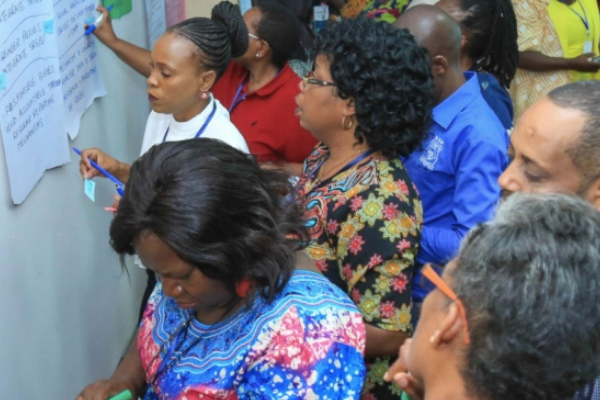The Education Unions Take Action to End School-Related Gender-Based Violence initiative, led by the UN Girls Education Initiative (UNGEI), Education International (EI), and Gender at Work, aims to ensure the safety of children, students, youth, and teachers in educational settings.
The Labour Research Service supports this initiative in Africa, with Nina Benjamin, Leader of the Transforming Unequal Gender Relations in the World of Work programme of LRS, facilitating “Hearing our Stories” workshops for teacher unions in West Africa, including, Sierra Leone Teachers Union (SLTU), Gambian Teachers Union (GTU) and Education International Regional Africa Office (EIRAF). The workshops are part of a peer learning and mentoring process for addressing school-related gender-based violence (SRGBV).
SRGBV is rampant in West Africa. Research shows that children in the region face violence throughout their schooling, including sexual abuse, exploitation, and corporal punishment. More than half of primary school children globally have experienced caning, despite warnings from experts that corporal punishment negatively impacts a child’s health, mental well-being, and academic performance. Sexual violence and abuse in and around schools are prevalent, with men being the main perpetrators. In many countries, it is common for men to be violent and for women to be submissive and passive.
Hearing SRGBV stories
Storytelling is the first step of the Gender Action Learning Process (GALP), which has been successfully used to address GBV in South Africa’s health sector. These are some of the stories shared by members of SLTU, GTU, and EIRAF:
Story 1: Misuse of authority
A jobless single mother struggling to pay her daughter's school fees befriended the headmaster, offering her daughter to do chores for him in exchange for paying the fees. The headmaster accepted, and the child became his maid. She was seen fetching water and cleaning his laundry and house. When the child stopped attending school for about a week, it was discovered she was pregnant. The mother initially claimed illness but later confronted the headmaster, who blamed her for pushing the child toward him. She reported him to the police, hoping he would support the child. This story highlights a headmaster abusing his authority by preying on a vulnerable child.
Story 2: A cover up
“A teacher raped an 11-year-old girl in his house when she went for extra tuition. Everyone thought the teacher was responsible because he was a family man. The mother wanted to report the case, but her husband and the community dissuaded her. They said it would spoil the names of the family and the teacher. So she didn’t report the rape, and they settled the issue amongst themselves. The teacher paid about $300 to the parents. The children in the community learned about this and blew the whistle. Police arrested the teacher and he is now in jail.”
Story 3:
"Years ago a headteacher pursued a female teacher for a long time. But she wasn’t interested. Everything the female teacher did thereafter was bad and he rebuked her all the time. She couldn't cope anymore and exploded during a staff meeting when he accused her of being incompetent. The headteacher got angry and pounced on the teacher right there. The matter went before the school management committee and he was exposed and suspended. The evidence showed he harassed other female teachers."
What the stories reveal about SRGBV in West Africa
Male teachers use their power and influence over female learners
The prevalent forms of violence in schools are sexual, physical, emotional, and exploitative. People in authority exploit the poor and vulnerable.
“We agreed that the power that men have comes from a range of institutions in society that perpetuate the notion that, naturally, men have power over women. To deal with SRGBV, we need to deal with the norms that perpetuate this power over women."
Nina Benjamin, Leader of the Transforming Unequal Gender Relations in the World of Work programme of LRS
“Imagine the little girl whose father, granny, and aunty all say she can’t tell anyone because she will shame and destroy the family. For the rest of her life, she will live with what happened to her. She will feel that nobody believes and supports her and that she is to blame. When we take up cases as a union, the perpetrator is transferred to work in another school. Imagine that child's pain when she sees her tormentor behaving as if nothing happened?"
“The youth have their ears on their backs, and if you flog their backs they will listen. This is seen as the traditional pedagogy. Parents came to school to request that children be caned. Children are caned publicly at the assemblies, and meanwhile, the flag is being raised.”
It is difficult to implement the existing measures against violence because society accepts and tolerates social and cultural norms that condone some level of violence against children. Take the example of boys who persistently harass uninterested girls as if it were a hunt. It is necessary to ‘evolve the nature of culture’.
"If I bring my two small children to this room and dress them both as boys, you would not know who is a girl and who is a boy. That is what school does to us - it equalises us. Teachers need to focus on equalisation."
The teacher unions aim to develop strategies and a continental campaign for ending SRGBV.
“This is the first time I am participating in a SRGBV workshop. I have learned a lot from the storytelling. You hear similar stories in the media and think journalists made them up."
“As a representative, I will start the discourse on SRGBV at my school and get my colleagues involved in taking action against SRGBV.”
“When I was listening to the stories, I felt bad and disturbed by the fact that 90% of the perpetrators of victimisation and harassment of female students are mostly male teachers and to some extent male students. Unions and the authorities need to take action to create safe schools.”







